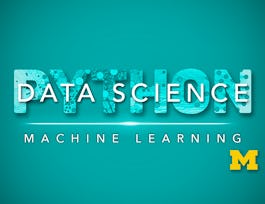This course will introduce the learner to the basics of the python programming environment, including fundamental python programming techniques such as lambdas, reading and manipulating csv files, and the numpy library. The course will introduce data manipulation and cleaning techniques using the popular python pandas data science library and introduce the abstraction of the Series and DataFrame as the central data structures for data analysis, along with tutorials on how to use functions such as groupby, merge, and pivot tables effectively. By the end of this course, students will be able to take tabular data, clean it, manipulate it, and run basic inferential statistical analyses.

Give your career the gift of Coursera Plus with $160 off, billed annually. Save today.


Introduction to Data Science in Python
This course is part of Applied Data Science with Python Specialization

Instructor: Christopher Brooks
806,424 already enrolled
Included with 
(27,081 reviews)
What you'll learn
Understand techniques such as lambdas and manipulating csv files
Describe common Python functionality and features used for data science
Query DataFrame structures for cleaning and processing
Explain distributions, sampling, and t-tests
Skills you'll gain
Details to know

Add to your LinkedIn profile
4 assignments
See how employees at top companies are mastering in-demand skills

Build your subject-matter expertise
- Learn new concepts from industry experts
- Gain a foundational understanding of a subject or tool
- Develop job-relevant skills with hands-on projects
- Earn a shareable career certificate


Earn a career certificate
Add this credential to your LinkedIn profile, resume, or CV
Share it on social media and in your performance review

There are 4 modules in this course
In this week you'll get an introduction to the field of data science, review common Python functionality and features which data scientists use, and be introduced to the Coursera Jupyter Notebook for the lectures. All of the course information on grading, prerequisites, and expectations are on the course syllabus, and you can find more information about the Jupyter Notebooks on our Course Resources page.
What's included
12 videos6 readings1 assignment1 programming assignment2 ungraded labs1 plugin
In this week of the course you'll learn the fundamentals of one of the most important toolkits Python has for data cleaning and processing -- pandas. You'll learn how to read in data into DataFrame structures, how to query these structures, and the details about such structures are indexed.
What's included
9 videos1 reading1 assignment1 programming assignment1 ungraded lab
In this week you'll deepen your understanding of the python pandas library by learning how to merge DataFrames, generate summary tables, group data into logical pieces, and manipulate dates. We'll also refresh your understanding of scales of data, and discuss issues with creating metrics for analysis. The week ends with a more significant programming assignment.
What's included
6 videos1 reading1 assignment1 programming assignment1 ungraded lab
In this week of the course you'll be introduced to a variety of statistical techniques such a distributions, sampling and t-tests. The week ends with two discussions of science and the rise of the fourth paradigm -- data driven discovery.
What's included
2 videos6 readings1 assignment1 programming assignment1 ungraded lab
Instructor

Offered by
Recommended if you're interested in Data Analysis

Duke University

University of Michigan
Prepare for a degree
Taking this course by University of Michigan may provide you with a preview of the topics, materials and instructors in a related degree program which can help you decide if the topic or university is right for you.
Why people choose Coursera for their career




Learner reviews
Showing 3 of 27081
27,081 reviews
- 5 stars
66.34%
- 4 stars
24.30%
- 3 stars
5.36%
- 2 stars
1.90%
- 1 star
2.07%
New to Data Analysis? Start here.

Open new doors with Coursera Plus
Unlimited access to 7,000+ world-class courses, hands-on projects, and job-ready certificate programs - all included in your subscription
Advance your career with an online degree
Earn a degree from world-class universities - 100% online
Join over 3,400 global companies that choose Coursera for Business
Upskill your employees to excel in the digital economy
Frequently asked questions
Access to lectures and assignments depends on your type of enrollment. If you take a course in audit mode, you will be able to see most course materials for free. To access graded assignments and to earn a Certificate, you will need to purchase the Certificate experience, during or after your audit. If you don't see the audit option:
The course may not offer an audit option. You can try a Free Trial instead, or apply for Financial Aid.
The course may offer 'Full Course, No Certificate' instead. This option lets you see all course materials, submit required assessments, and get a final grade. This also means that you will not be able to purchase a Certificate experience.
When you enroll in the course, you get access to all of the courses in the Specialization, and you earn a certificate when you complete the work. Your electronic Certificate will be added to your Accomplishments page - from there, you can print your Certificate or add it to your LinkedIn profile. If you only want to read and view the course content, you can audit the course for free.
If you subscribed, you get a 7-day free trial during which you can cancel at no penalty. After that, we don’t give refunds, but you can cancel your subscription at any time. See our full refund policy.



